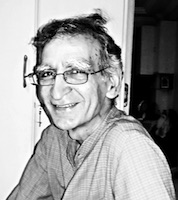The dominance of communal consciousness in social space is very frightening. The prevalent “social common sense” looks at history through the prism of the kings’ religion and that too very selectively. This version picks and chooses from events to “construct a past” suitable to its ideology, the communal one. This ideology has been at the root of the hatred that has been built up among communities – hatred towards Hindus propagated by Muslim communalism and hatred towards Muslims propagated by Hindu communalism. This hatred has led to communal violence, in which innocent people are killed and communities polarized for electoral benefits. The same ideology looks down on inter-religious marriages and cultural expressions that unite people. Currently, the marriage between a Muslim boy and a Hindu girl is denigrated as “love jihad”. To top it all, now the baby born from such a marriage is being hurled abuses at, instead of the usual welcome that the newborn deserves.

On 20 December 2016 Kareena Kapoor and Saif Ali Khan were delighted as their bundle of joy, a baby boy, arrived. They named him Taimur (also pronounced as Timur) and all hell broke loose on social media. Many communalists wished ill for the baby. They said they were pained by the name “Taimur”, which was the name of the invader who had plundered and killed the people of Delhi in 1398. Interestingly, at the time, Mohammad Tughlaq, who was a Muslim with Turkish lineage, ruled Delhi. Taimur, Genghis Khan and Aurangzeb in particular are painted as the major villains of medieval Indian history and as representative of the Indian Muslims today. Genghis Khan was a Mongol, the builder of Mongol Empire. He was a Shamanist (not a Muslim), who had also killed and plundered north India. Aurangzeb is regarded as a tyrant who imposed Jizia (tax on non-Muslim subjects of Muslim states), forcibly converted people to Islam and destroyed Hindu temples. This history has now been used to demonize the Muslims of today, even though these kings weren’t all Muslims and in any case, their acts were not inspired by religion.
The plunder of wealth and killings were part of the invasions in the past and had nothing to do with religion. While the courtiers of those kings might have used religion as a cover, it wasn’t just the kings of a particular religion or region who were plundering and killing at the time. Kings were plundering areas in their own territory and exacting tribute. It was not a period of “laws” or “nationalism” as understood today. Kings were sovereigns and their acts were not questioned. Incidentally the clergy, cutting across religions, provided the cover of religion and sanction of God for the acts of these kings. The concept of India or Bharat does not apply to this period. Rana Sanaga invited Babar to ally with him and defeat Ibrahim Lodi. The Muslims kings had many Hindu courtiers on top rungs of power and vice versa.

While in India today, Muslim kings or kings with Muslim-sounding names are painted as villains, Shivaji, Rana Pratap and Govind Singh are projected as the heroes of Hindus. Godse, the killer of father of the nation, Mahatma Gandhi, says that as a nationalist, Gandhi was a pigmy in comparison to nationalists like Shivaji, Rana Pratap and Govind Singh. It is interesting to note that initially there was a great resistance in Gujarat and Bengal to accepting Shivaji as a national hero. Shivaji’s army had plundered these two areas and killed the local people. Today, to say that Shivaji had also plundered and killed, is tantamount to insulting a “national icon”. One Bal Samant – who was close to Bal Thackeray, very much accepted by Hindu nationalists – devotes nearly 21 pages of his book Shivkalyan Raja to the chapter on the looting by Shivaji. He quotes from Dutch and British sources to give an account of the exploits of Shivaji’s army. The massive carnage that Ashoka oversaw in Kalinga is well known. Most kings have undertaken the killings to expand their empires to take revenge on an enemy kingdom.
With the communal ideologies holding sway, interpretations have also changed. Narendra Modi described the loot carried out by Shivaji’s army as the loot of Aurangzeb’s treasury! The account of the Maratha army destroying the Hindu temple in Srirangpatna Hindu temple has been pushed to the margins of consciousness. Similarly, the account of the first war of independence in 1857 has been distorted. While Savarkar, the Hindutva ideologue, describes it as the first war of Independence, Golwalkar, another Hindutva ideologue, says that the rebellion failed as a Muslim, Bahadur Shah Zafar, was leading it and was unable to inspire Hindu soldiers. Actually, the revolt failed when Punjabis and Gurkhas came to the rescue of the British.
Communal ideology rests on this distorted version of history and religion becomes the primary motive in this narrative. Taking it to murkier depths, some commentators have gone to the abysmal low by abusing this child of the actor couple as a terrorist and a jihadi. All newborns deserve a welcome into this universe. Saif Ali Khan, in his article in the Indian Express, told us how their marriage to Kareena Kapoor was opposed as “love jihad”. One tweet warned the Hindu girls that they should not marry Muslim boys, as they may give birth to a Genghis Khan or a Taimur or an Aurangzeb. With this, the divisive mindset stooped to a new low.
Forward Press also publishes books on Bahujan issues. Forward Press Books sheds light on the widespread problems as well as the finer aspects of the Bahujan (Dalit, OBC, Adivasi, Nomadic, Pasmanda) community’s literature, culture, society and culture. Contact us for a list of FP Books’ titles and to order. Mobile: +919968527911, Email: info@forwardmagazine.in)





